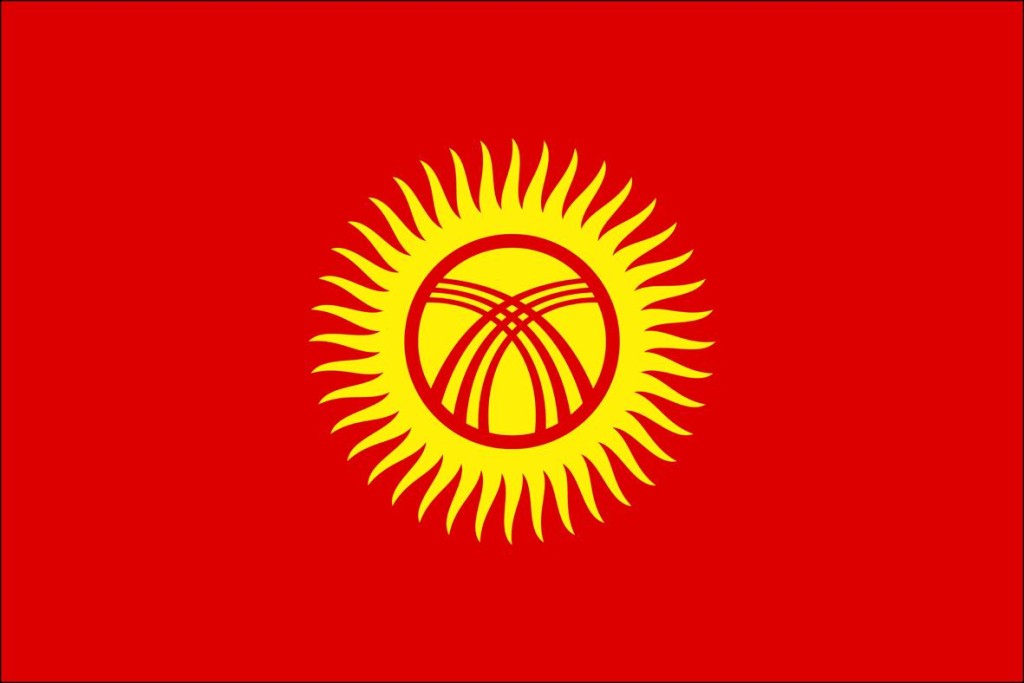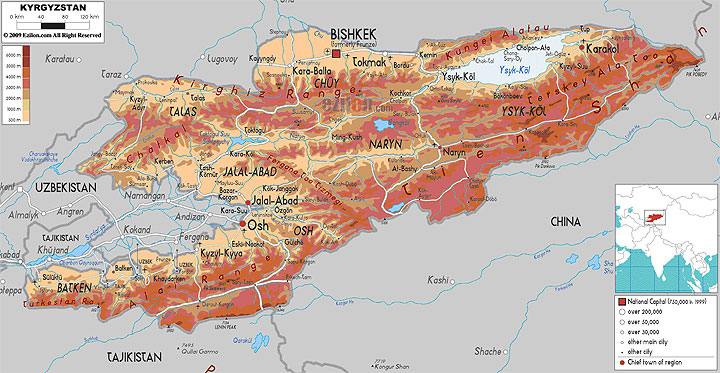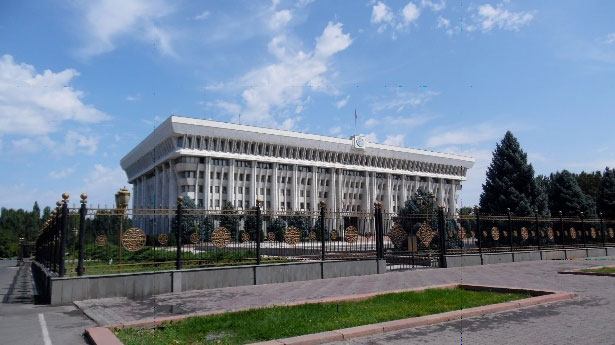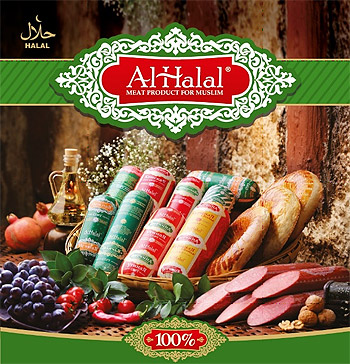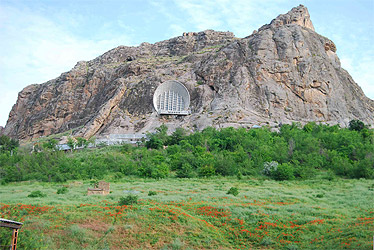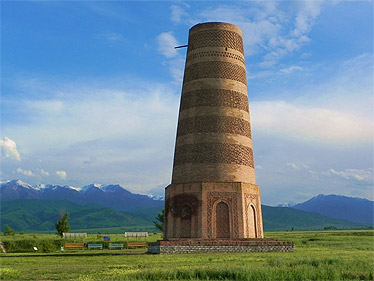Country Feature : Kyrgyz Republic
THE KYRGYZ REPUBLIC
BASIC INFORMATION
| Capital : | Bishkek |
| Official languages : | Kyrgyz (national), Russian (official) |
| Type of Government : | Parliamentary |
| President: | Almazbek Atambaev |
| Prime Minister: | Djoomart Otorbaev |
| Independence from USSR: | Aug 31, 1991 |
| Climate: | Continental, from -40 degrees in winter to +40 in summer |
| Land Area : | 198,400 Square Kilometers; borders China, Tajikistan, Uzbekistan, Kazakhstan. 94.2% of land is at an altitude of over 1000 meters above sea level 40.8% above 3000 meters |
| Population : | 5.776 million (2013) |
| People: | The Kyrgyz, a Sunni Muslim, Turkic-speaking pastoral people, constitute 72,6% of the population; the rest are Uzbeks (14,5%), Russians (6,4%), and other minorities (6,5%). The Uzbeks reside largely in the southwest |
| Currency: | KGS (Kyrgyz Som) |
| GDP (nominal): | $7.226 billion (2013) |
| Exports: | $2.019 billion (2013); $1.927 billion (2012) |
| Gold, cotton, wool, garments, meat, tobacco; mercury, uranium, electricity; machinery; shoes
Kazakhstan 26.2%, Uzbekistan 26.1%, Russia 14.6%, China 7%, UAE 6.1%, Afghanistan 5.2% (2012) |
|
| Imports: | $6.069 billion (2013); $5.576 billion (2012)
Oil and gas, machinery and equipment, chemicals, food China 55.2%, Russia 17.4%, Kazakhstan 7.9% (2012) |
ECONOMY OVERVIEW
Since independence in 1991, the Kyrgyz Republic, with assistance of donors such as the World Bank and Asian Development Bank, has progressively adopted an open trade and investment regime. It was the first Commonwealth of Independent States to be accepted into the World Trade Organization. A recent OECD Regulatory Restrictiveness Index, a way to measure discriminatory policies against foreign investors, puts Kyrgyzstan in close to the OECD average on the index, much better than its neighbor, Kazakhstan.
Kyrgyzstan is a mountainous area bordering Uzbekistan, Kazakhstan, China and Tajikistan. The country is rich in agriculture resources with products such as sheep, goats, cattle, and horses, cotton, tobacco, potatoes, sugar beets, vegetables, grapes, fruits, and berries are grown;
It has deposits of gold, rare earth metals, coal, oil, natural gas, nepheline, mercury, bismuth, lead, zinc, and uranium. Industries include food processing, nonferrous metallurgy, forestry, and the manufacture of apparel and textiles, agricultural machinery, appliances, furniture, and electric motors. In addition, the country is also noted for such traditional handicrafts as woodcarving, carpet weaving, and jewelry making.
• 60 gold deposits explored
• 7 deposits of antimony and 3 major deposits of tin and tungsten
• Coking coal projected reserves are 260 million tons
• 15 oil and gas fields developed
Abundant water supply provides 53% of energy resource, with the country exporting power to its neighboring countries. The hydropower industry has a potential of 142 billion KWh.
Many citizens work abroad, especially in Kazakhstan and Russia, and their remittances are important to Kyrgyzstan’s economy, representing 24.8 % of GNP in 2013.
Just recently, the government signed an agreement to join the Eurasian Customs Union, composed of the economies of Russia, Belarus and Kazakhstan. The combined economies represent a $ 2.393 trillion GDP and Kyrgyz Republic is positioning itself as the destination of choice for foreign investors interested in establishing a presence in the Eurasian Customs Union.
Malaysian Exports to Kyrgyz Republic
Trade Data from 2013 shows Malaysian exports to Kyrgyz Republic representing electrical and electronic equipment, palm oil, furniture, cocoa products, soaps, lubricants, and rubber.
Malaysian Imports from Kyrgyz Republic
Trade Data from 2013 shows Malaysian imports from Kyrgyz representing precious stones, metals, coins, electrical and electronic equipment, machinery, honey.
Kyrgyz Republic has opportunities on being potential supplier for Malaysia on the following products:
• fruits and vegetables
• meat and meat products
• dairy products and honey
• clothing goods and apparels
• bottled potable water
Foreign Direct Investment
Foreign direct investment has steadily increased reaching $1 billion in 2013 from around $600 million in 2012. Investments are primarily in extractive industries such as mining and energy although investments in manufacturing such as metal fabrication as well as food and textile processing have increased. Canada followed by China, UK and Germany are the main sources of foreign direct investment.
Current Investments in the Kyrgyz Republic
Centerra Gold is one of the largest gold mining companies in the world.
Russian Oil Company Gazpromneft Asia Ltd is the largest operator at wholesale and retail markets of oil products and liquefied hydrocarbon.
Kazakhmys Gold Kyrgystan, a subsidiary company of Kaz Minerals, a global copper mining company.
“Coca-Cola bottlers” produces and distributes carbonated soft drinks and bottled water.
Hyatt Regency Bishkek is the leading five-star hotel in the country.
Beeline, a subsidiary company of Vimpelcom Ltd., Netherlands, is a leading mobile operator.
Demir Kyrgyz International Bank is the first international bank, owned by Turkish and European investors.
Russian conglomerate Wimm Bill Dann, owned by PepsiCo of the US, manufactures dairy products and infant food.
Beta Group is Turkish conglomerate with investments in a tea-packing factory and shopping malls.
Dairy Spring is the producer of cheese products with initial investments from a Swiss company.
LSC “Avinien”
Korean conglomerate Pohang Iron and Steel (POSCO) and National Center on Complex Processing of Mineral Raw Materials of the Republic of Kazakhstan are currently building a plant to process aluminium ferrosilicon.
5 Reasons to invest to the Kyrgyz Republic
• Strategic location in the Central Asia – next door to China, world’s second largest economy
• Tax – lowest in Central Asia
• Skilled but inexpensive labor force – in 2013, average monthly salary was USD235
• Free Economic Zones – in 2012, turnover was USD347 million
• Inexpensive electricity – abundant water resources for hydropower energy
Private Public Partnerships
As reflected in the National Strategy for Sustainable Development 2013 -2017 the Government of the Kyrgyz Republic aspires to increasingly apply Public Private Partnerships (PPP) to deliver public infrastructure projects and related services. This strategy is driven by the need to improve the quality of infrastructure and the government’s limited budgetary resources. A PPP Law and related institutional set-up has been adopted in 2012 to facilitate the development of PPP and in 2014 a Project Development Support Fund has been established aimed financing project preparation and advisory services.
Noorizah Binti Hj Abd Hamid, Managing Director, PLUS Expressways, Malaysia, presented Malaysia’s experience in developing and implementing roads/highway sector PPP projects at the ‘High-level Forum on Public-Private Partnerships (PPPs)’, organized by the Kyrgyz Government from 23-24 May 2013 in Bishkek.
As of November 2014, some 15 projects are under preparation. This project pipeline includes among others specific health care services and medical facilities, roads, mini hydropower plants, energy distribution. Some of these projects are expected to be tendered in 2015.
Halal Industry
With Muslims representing 80% of the Kyrgyz population, the government is promoting the halal business, which is still at its infancy. The Ministry of Economy prepared a strategy paper outlining the steps to expand the Halal industry not just for the domestic but also for the export market.
The country needs assistance in upgrading its infrastructure such as slaughterhouses and laboratories as well as the technical knowledge of veterinarians and inspectors to comply with international standards for Halal. Qatar and Saudi Arabia have discussed possible areas of cooperation with Kyrgyz Republic to modernize and expand its halal business.
Islamic Banking and Finance
In May 2006 Islamic Development Bank (IDB), the Kyrgyz Republic and OJSC “EcoBank” signed a Memorandum of Understanding to introduce Islamic banking and finance to the Kyrgyz Republic.
“EcoIslamicBank” is the first and the only Islamic bank in the Kyrgyz Republic. It has played a leading role in promoting the Shariah-based financial products and services to the Kyrgyzstan market.
The National Bank of the Kyrgyz Republic has approved the following contracts: Mudharabah, Sharikat and Musharakah, Murabaha, Isaiah and Ijarah Muntahia Bittamleek, Qard Hasan, Istisnaa and Parallel Istisnaa, Salam, Wadiah Dhamanah and Wadiah Yad Amanah.
Kyrgyz Republic encourages the expansion of Islamic banking and financial instruments. It is the process of introducing Sukuk and Takaful to the financial market.
Tourism
Kyrgyz Republic is an amazingly beautiful country; enclosed by mountain ranges, glaciers and fresh water lakes. The country’s nomadic history is a blend of about eighty different cultures, intermingling for centuries, laying the foundation for a dynamic and vibrant society.
• More than 3 million visitors a year
• Issyk Kul Lake- second largest alpine lake in the world
• Silk Road cultural and historical sites
• Pristine mountains, lakes
• Wildlife such as the snow leopard, eagles, mountain goats, horses
Islamic Heritage Sites
Sulaiman Too Sacred Mountain
Sulaiman- Solomon’s Mountain is a 1000 meters high rocky spur of Alay mountain range. It is surrounded by Kyrgyzstan’s second largest city Osh and was a major place of pilgrimage in the Central Asia for Muslims as well as pre-Muslims. The mount located in the vast plains of the Fergana Valley, acted as a beacon for caravans on the Silk Route and was revered as a sacred mountain. Some historians are of the opinion that the peak of the mount is tower and the main signpost of the Silk Road described by the Ptolemeus. Its five peaks and slopes contain numerous ancient places of worship and caves with petroglyphs as well as two largely reconstructed 16th century mosques. For many Muslims of the region it is the most sacred place after Holy cities of Makkah, Medinah and Jerusalem.
In June 2009, it became the first site in Kyrgyzstan to be included in the UNESCO World Heritage Site. According to its report, “The site is believed to represent the most complete example of a sacred mountain anywhere in Central Asia, worshipped over several millennia.”
Burana Tower
The name “Burana” most probably comes from wrongly pronounced word “Monara” which means Minaret. Minaret is an obligated part of any mosque, it is a tower from which the Muslims were called up for the next praying. Some centuries ago, the tower was 44 meters high, but after an earthquake in early 1900, the upper part fell down.
The tower and a mosque were located in the city center of Balasagyn town – one of the centers of Karahanid state. The large area around the town was enclosed with 2 rows of fence, that still visible from the top of the tower. Nowadays there is a small museum of Burana, represented with the tower, the remains of three tomb mausoleums, and other exhibits, such us: stone sculpture – Balbals, petroglyphs, coins and other things founded during scientific explorations.
For more information on business opportunities in Kyrgyzstan, please contact Mr Syrgzak Abakirov at syrgak.a@gmail.com or go to www.invest.gov.kg
An Investment and Business delegation from the Kyrgyz Republic will be visiting Kuala Lumpur in the 1st quarter of 2015
An Investment and Business delegation from the Kyrgyz Republic will be visiting Kuala Lumpur in the 1st quarter of 2015. For more information, please contact MASSA Secretariat at Tel: 03-2078 3788 / Email: mail@massa.net.my
Contact Details of Embassy of the Kyrgzy Republic in Kuala Lumpur, Malaysia
Contact Person: Mr Ulan Djusupov Charge d’Affaires a.i Embassy of the Kyrgyz Republic 10th Floor, Wisma Sin Heap Lee 346, Jalan Tun Razak 50400 Kuala Lumpur Tel: 603-2163 2012 / 2164 9862 Fax: 603-2163 2024 Email: kgembassymy@gmail.com , info@kgembassymy.com Website: www.kgembassymy.com

